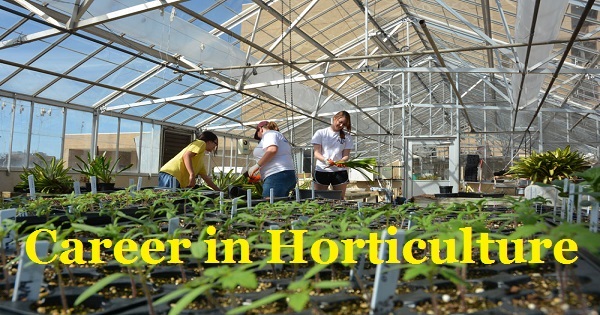

Careers in Horticulture
Naief Khatri

Horticulture is the branch of Agricultural Science that deals with the cultivation of plants, vegetables, flowers, fruits, herbs, shrubs, bushes, ornamental trees and landscaping for gardens, maintaining nurseries, green houses, gardens, orchards and plantations and also floriculture or cultivation of flowers.
The branch now has also direct or indirect application in food technology industries as Production, harvesting and storing of vegetables all are highly mechanized and merges into food technology. Plants are grown under strictly controlled conditions using sophisticated sensors, computers. Biological control of pests and diseases is common.
Horticulture Eligibility Criteria
Entry to this field starts from undergraduate level. After completion of 10+2 in Science stream (class 12th) with physics, chemistry and maths/biology/agriculture as the subjects one can opt for Bachelors degree in Horticulture as a separate discipline or as a subject of BSc Agriculture Science. The same basic qualifications are required for doing a diploma in agriculture.
Most of the educational institutions in India teach horticulture as a part of the agricultural Science, while some offer a separate B.Sc. degree. Candidates can choose between doing a B.Sc. in agriculture or horticulture. After doing BSc in Horticulture one can continue his/her further study in the field by doing MSc or PhD.
The minimum qualification for admission to various Master’s programs in agriculture is 60 per cent marks or equivalent in graduation in same or related streams. For instance, in order to get admission to MA in Pomology; Floriculture and Landscaping; or Vegetable Crops a B.Sc degree in Agriculture or Horticulture is required.
Horticulture Career Prospects
Horticulture is a field that holds ample scope. Whether you want to be full-time or part-time horticulturist, whether you have your own piece of land or not, you can take up this line and make a decent living out of it.
This career is extremely lucrative since not only are the demands for good plants, flowers, fruits increasing but the technology (in terms of preserving these perishable products) too is becoming more sophisticated which ensures better results. The export industry is also helping build up the number of available jobs.
The demand of a commercial horticulturist in today’s rapidly growing horticulture industry has increased considerably. There is a vast employment opportunity in the commercial or environmental sectors as well as in research and journalism.
Both public and private sectors offer employment to qualified and trained horticulturists with attractive remuneration. There are also job openings in UK and US for trained and qualified horticulturists.
Job Opportunities in Horticulture
- One can apply for the District Horticulture Officer/ District Agriculture Officer through examination conducted by State Public Service Commission
- Apply for the post of Technical Assistant / Technical Officers in Agricultural Universities ICAR, DRDO, IARI, & CSIR.
- Work as a designer or contractor for landscaping projects or work in the companies dealing with seeds, fertilizers, sprays and other related fields of horticulture.
- A horticulturist can also choose his/her career in education sector as a professor.
- Those holding PhD degree can apply for examination conducted by the Agriculture Scientist Recruitment Board, ICAR, New Delhi for the post of Scientist
Horticulture Pay Package
The monthly remuneration of an Asst. horticulture inspector (appointed by respective state or central government) starts from Rs 7000 and goes up to Rs 17, 000 depending upon experience and total years of service. District Horticulture Officers get monthly salary more than Rs 20, 000. The salary of Horticulturists and scientists varies between Rs 18, 000 and 25, 000.
The salary of a horticulture professionals in private sector is more as compared to public sector. They get handsome salary apart from other benefits as fixed by the respective firm/company.
Horticulture Institutes/Universities
- Kerala Agricultural University
Course: MSc (Horticulture)
- University of Agricultural Sciences, Bangalore
Course: MSc (Horticulture)
- Dr. Panjabrao Deshmukh Krishi Vidyapeeth
- University of Agricultural Sciences, Dharwar
Course: B.Sc. (Hort), M.Sc. (Horticulture)
- Annamalai University
Course: BSc (Horticulture)
- Allahabad Agricultural Institute, Allahabad
Course: M.Sc. (Ag.) Horticulture (Vegetable Science), M.Sc. (Ag.) Horticulture (Floriculture & Land Scaping), M.Sc. (Ag.) Horticulture (Fruit Production & Post Harvest Technology)
- Sri Krishnadevaraya University, Ananthapur
Course: BSc (Horticulture)
- Tamil Nadu Agricultural University, Coimbatre
Course: B.Sc. (Horticulture), B.Tech. (Horticulture)
- Calcutta University, Kolkata
Course: MSc (Horticulture)
- Acharya N.G. Ranga Agricultural University
Course: Diploma in Horticulture, B.Sc. (Hort), M.Sc. (Horticulture)
Latest News
People Reading Now

CBSE Compartment Result 2023 OUT: Click For Direct Link



CSAB 2023: Special Round Registration Begins Today


